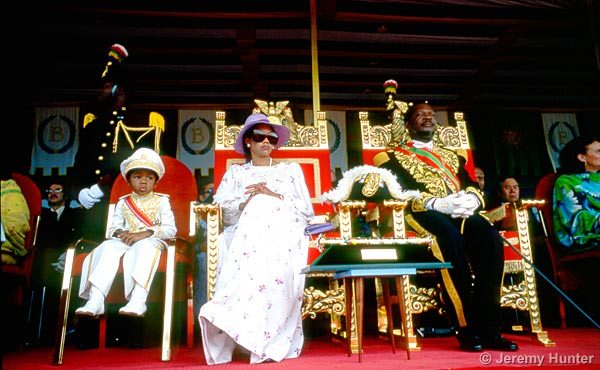In tyrants Africa has had to endure, none proved more eccentric than Jean-Bédel Bokassa of the Central African Republic (CAR). He is estimated to have fathered 54 children by various lovers, including Romanian, Tunisian, Gabonese, French, Vietnamese, and Belgian ladies.
The others were Libyan, Cameroonian, German, Swede, Zairean and Chinese ladies. He is, however, recorded to have had 17 official wives.
In a publication by Italian writer Riccardo Orizio, translated from Italian to English by Avril Bardoni, Orizio, who interviewed the troubled ruler a year before his death, sheds light on some of the happenings during the life and times of Bokassa who died from a heart attack on November 3, 1996, aged 75 and buried at Berengo.

Orizio writes: “In 1965, Jean-Bédel Bokassa led a military coup against David Dacko, the president of the Central African Republic. He seized control of the government; Dacko was thrown into prison.
“Having annulled the constitution, Bokassa made himself President, then President for Life in 1972, then Marshal of the Republic in 1974. In 1977 he decided to crown himself Emperor. His coronation was held on December 4, 1977, in the Palais des Sports Jean-Bédel Bokassa, next to Jean-Bédel Bokassa University, on Bokassa Avenue.”
Curiously, Idi Amin of Uganda, Mobutu Sese Seko of Zaire and Omar Bongo of Gabon, who were supposed friends with the eccentric military man, declined to attend the coronation.
Key invited guests turning up or not, Bokassa was set on having a ball and imported 24,000 bottles of Moët & Chandon, 4,000 bottles of Château Mouton-Rothschild and Château Lafite Rothschild.
Sixty Mercedes cars got shipped from Germany to Cameroon and then flown 740 miles over the forest of Central Africa to Bangui, the capital.

Bokassa, as a soldier, had once fought for France and done personal favours for French politicians but his rebellious father, a chief, had refused to work with French colonial authorities.
He was killed, with Bokassa as a witness when he was just 6. Bokassa’s distraught mother committed suicide a week later, leaving behind 12 children. At age 18, Bokassa joined the French army, participating in the Allied landing in Provence, fighting in Indochina and Algeria, for which he was decorated, commissioned and given French nationality.
He often boasted that the CAR did not incur any debt with his coronation as France gave $20 million for the event, stating that it was a little gift for all his services.
After the 1979 coup backed by the French leader D’Estaing which ended his reign, Bokassa claimed the French tried to poison him on several occasions, making his body weak.
He, however, attributes surviving to a silver cross Pope Paul VI gave him when the Pope secretly nominated him as the thirteenth apostle of the Holy Mother Church.
According to Orizio, Bokassa informed him that the Pope, during his visit to the Vatican on July 30, 1970, gave him the cross.
“Shortly beforehand, he baptized me with a special ceremony in his private chapel. He asked if I was prepared to receive a great honour. I said I was and he celebrated the rite. My role in the Catholic Church has been a special, secret one ever since. When I was in power I acted as a mediator for the Vatican in various conflicts, such as that between Libya and Egypt,” Bokassa recounted.
Bokassa continued: “The Pope himself gave me this crucifix. Together with my thirteen Bibles, it is the only thing I have left. Everything else—land, decorations, power, women— belongs to the past. This house, Villa Nasser, I have given to my ex-wife, Madame Catherine, even though she doesn’t deserve it after her adultery with Valéry Giscard d’Estaing. The man stole my diamonds and my wife. A pirate. He treated me like that because I am an African. But no matter. Today, thanks to divine intervention, I am a man of peace and faith. Inside, I am still His Majesty Bokassa the First, Apostle of Peace and Servant of Jesus Christ, Emperor and Marshal of Central Africa.”
But it wasn’t only a crucifix Jean Bédel-Bokassa received from the Pope on the day. He also noted: “I was baptized in 1950 at Fréjus, where my old French regiment was based. I received my baptism as thirteenth apostle on July 30, 1970, from Pope Paul VI. I was president from 1966 to 1976.”

Whiles on a trip to Libya, a bloodless coup d’état – ‘Operation Barracuda’ – was staged on September 20, 1979. On November 20, 1980, he was condemned to death in absentia.
In the same year, he was extradited to a prison in the Ivory Coast, and then extradited to France, where he remained under supervision for two years before being finally repatriated to Central Africa on November 23, 1986, to stand trial for treason and murder.
Bokassa’s trial lasted from November 23, 1986, until June 2, 1987, when he was again sentenced to death. The sentence was subsequently commuted, first to life imprisonment and twenty years’ forced labour, then to ten years’ forced labour. He gained his freedom on September 1, 1993.
In 1970, he solemnly announced to the nation that he had awarded himself the title of ‘Grand Master of the International Brotherhood of Knights Collectors of Postage Stamps’.
Other titles he went by include President for Life, Minister of Defence, Minister of Justice, Minister of Home Affairs, Minister of Agriculture, Minister of Health and Minister of Aviation.
Charges levelled against him included cannibalism, misappropriation of public funds and concealment of children’s bodies.
But Bokossa refuted the cannibalism charge: “The story about cannibalism was invented in order to destroy me. It’s a lie. Do you really believe that a much-decorated French officer could be a cannibal? It’s a lie,” he said.










